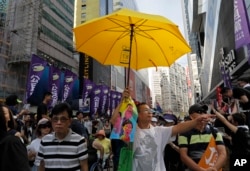Learning how to avoid being watched is a new skill for Andy Chan, founder of the Hong Kong National Party.
In July, Chan discovered that he was being followed by unidentified individuals. He noted that they would suddenly disappear, only to reappear later or be replaced by other individuals.
Chan did not fully know it at the time, but he was being watched by members of Hong Kong's Security Bureau. The surveillance campaign against Chan was part of a two year investigation into the Hong Kong National Party. It supports Hong Kong’s independence from China.
In the past, bureau officials have said that freedom of association and freedom of speech are "not without restrictions."
Chan's party may become the first to be banned by police since Britain returned control of Hong Kong to China in 1997. But his story is not uncommon in a city with a long history of political surveillance.
Historians say surveillance of politically suspect citizens has been a part of life in Hong Kong for much of the past 100 years. In the 1920s, agents working for the colonial government forced some newspapers to close and observed strikes. Such political surveillance continued into the 1970s.
Observers say surveillance appears to be on the rise again in Hong Kong. They say the increase began after the pro-democracy Umbrella Movement protests in 2014.
Law Yuk-kai is the director of the Hong Kong Human Rights Monitor. Law said his group has noted an increase in activity by Chinese spy agencies in Hong Kong during important political events.
The work of these agencies is hard to prove. But some have succeeded in exposing it. The Reuters news agency investigated one such example. In 2014, Hong Kong democratic legislator James To stopped an operation by several Chinese agents who were following him. He had them arrested by local police.
Activists also say they suspect Chinese intelligence agents were responsible for the 2015 disappearance of five booksellers who traded in banned books. The booksellers later reappeared in a Chinese prison.
Hong Kong’s Interceptions of Communications and Surveillance Ordinance requires a judge or law officer to approve of surveillance in the home or the use of electronic monitoring.
Under the measure, the work of Hong Kong police is monitored. But Law said it is unclear how it relates to private citizens. He noted that following people in public is legal because individuals are not protected by privacy laws.
Experts say that leaves most Hong Kong citizens with few choices.
Chan is still not sure who was watching him. But like many Hong Kong activists, he appears to accept it as a new part of life.
I’m Jonathan Evans.
Erin Hale reported this story for VOA News. Jonathan Evans adapted her report for Learning English. George Grow was the editor.
_____________________________________________________________
Words in this Story
monitor – v. to watch, observe, listen to, or check something for a special purpose over a period of time
surveillance – n. the act of carefully watching someone or something especially in order to prevent or identify a crime
association – n. an organization or group
expose – v. to make known






